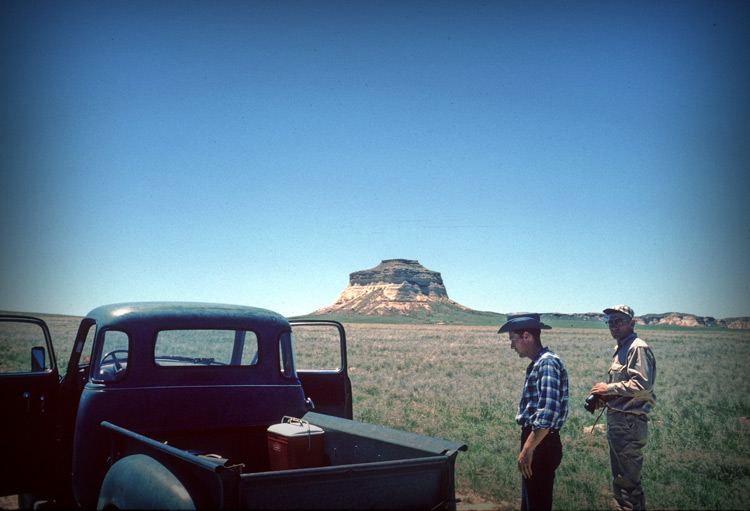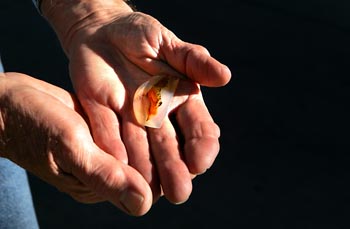







Crossing chapters
Jump to:Related content

Crossing forums
 Forum at the Rocky Mountain News in Denver.
Forum at the Rocky Mountain News in Denver.
 Forum at the Union Colony Civic Center in Greeley.
Forum at the Union Colony Civic Center in Greeley.
Podcasts:
Acknowledgements
"The Crossing" could only be told with the help of many people:
- The more than 80 people touched by the tragedy of Dec. 14, 1961, who agreed to tell their stories.
- Bill and Mary Bohlender, who helped unearth numerous historic documents and provided numerous insights.
- Virginia Shelton and Mary Shelton Shafer, who provided numerous insights and access to attorney Jim Shelton's files.
- Keith Blue, who provided numerous insights.
- Peggy Ford and the staff at the City of Greeley Museums, Barbara Dey and the Hart Library staff at the Colorado History Museum and former Rocky librarian Carol Kasel, who all assisted with research.
Contact the series team
- Reporter: Kevin Vaughan
- Photographer: Chris Schneider
- Video: Tim Skillern & Laressa Bachelor
- Print designer: Armando Arrieta
- Web designer: Ken Harper
- Web producer: Forrest Stewart
- Web developer: Chris Nguyen
- Copy editor: Dianne Rose
- Photo editor: Dean Krakel
- Imager: Marie Griffin
- Interactive editor: Mike Noe
- Project editor: Carol Hanner
Duane Harms swings open a black wrought-iron screen door and steps out of the darkness, into the unrelenting afternoon sun of Southern California
The rumors in Greeley were wrong.
He has not changed his name. He has not gone crazy. He has not killed himself.
He offers a handshake outside the simple stucco home where he has lived for the past 40 years. This is the place he brought his wife, Judy, and their baby girl, Lynda, after a thundering locomotive slashed through his school bus 45 years ago.
This is the place where they started a new life among the palm trees and the rocks.
He is 68. He is balding, and what's left of his hair has gone gray. He has added a few pounds over the years, but not many. He looks like a farmer from the plains of northeast Colorado: sturdy boots, blue jeans, a leather belt cinched up tight, a snap-front Western shirt and a Detroit Tigers ball cap. He walks with a slight stoop. His penetrating blue eyes are clear and vulnerable all at the same time.
He lives in a semirural area tucked in among a sprawling city of shopping malls, chain restaurants and houses lined up one after another. His home is the only one on the street with a curb and a sidewalk. A single, shapely pine tree stands on his trimmed front lawn. An explosion of red flowers covers the hedge that guards one side of the driveway. A mailbox on a red post stands next to the street.
In the distance, a rooster crows. Several times a day, a train's horn wails. Down the street and around the corner — a few hundred yards away — children play in the yard of a school. Three-tenths of a mile in the other direction sits another school.
As far as Duane Harms is from Colorado, it's not far enough to escape Dec. 14, 1961.
Even now, 45 years later, he sometimes worries at an intersection that he'll get hit broadside. When a stranger knocks on his door, he fears it will be someone who wants revenge for the dead children.
When he thinks about the accident, he blames himself.
"I always stopped at that crossing," he says. "I just figure I didn't take enough care, enough time that day."
Pushed out of Colorado
Duane never wanted to drive a school bus in the first place.
He had gone to college for a time, mostly at Judy's urging, but he didn't like it, wasn't motivated, didn't do well. He wanted to find a trade, something that would let him work with his hands. So while Judy finished her college work in Greeley, he took a job as a janitor at the Delta and Auburn schools outside town. He worked out a deal with the district, renting the teacher's house next to the Auburn school.
In the summer of 1961, his boss asked him to take on an additional job — driving the school bus.
Duane didn't want to do it. He was already busy as a janitor, and the hours could be long.
He finally relented, and, as the fall school term approached, he went out in the bus one day with a district administrator, driving the route, learning the homes of the children he would pick up. He pulled up to the crossing three-quarters of the way through the route. A train rushed toward them.
"Go," the administrator said, "you've got plenty of time."
"No," Duane responded, "I'm waiting."
Less than four months later, at the same spot, the train hit his bus.
After the trial and his acquittal on manslaughter charges, Duane knew he had to get his family out of Colorado.
There had been nasty phone calls and threats, such as the day two men showed up at his small home and backed him against the wall as they verbally laid into him.
By the summer of 1962, Judy had finished her college work and earned her teaching certificate. They packed up and headed west to California, which seemed to offer the best pay and opportunities for teachers.
Judy got a teaching job.
Finding work
Duane filled out an application at the local school district, seeking work in the maintenance department. He wasn't sure he'd even have a chance with the accident in his background. But he was hired as a custodian in the maintenance shop, cleaning up at the end of the day after others had finished their work.
He liked the job, but he wanted more, so he began studying to be an electrician. He learned the trade. He passed the tests. He got a job with the school district.
"I found out I wasn't so dumb," he says.
The work was satisfying. Whether it was a big, complicated project or something simple, like putting in a new outlet, he was happy with his tools in his hands.
"It was different every day," he says.
He found other joys away from work, sometimes in quiet solitude, sometimes at a raucous ballpark.
As a youngster, he'd been fascinated by petrified wood. On the family wheat farm southwest of Fleming, he had picked up interesting rocks and arrowheads.
After the bus crash, he had sought solace in gems and minerals. Once, a few months after the accident, he drove out to the Pawnee National Grassland with the assistant principal from Delta Elementary School, a picnic lunch in a cooler, to hunt for rocks among the sand and sage.
Even now, he sits out behind his home in the shade, a polishing wheel spinning in front of him, a piece of agate in his hands, water flying. He works for hours at a time as he takes something that is merely interesting and makes it sparkle and shine.
Duane also found pleasure in sports.
Back in high school, he'd been a pretty good basketball player, a 6-foot-1-inch forward for his Fleming Wildcats. He wasn't a great ball-handler, but he was a good shot and a good rebounder, and he had some spring in those slender legs.
Back then, he could stand beneath the bucket and jump up and grab the rim. He didn't need a running start.
"I could dunk," he says, "but I thought that was showing off."
In the spring of 1956, he nailed two key baskets in the closing minutes to help the Wildcats earn a spot in the finals of the regional tournament at the Eighth Avenue Gym in Greeley. In the championship, he scored a basket to give his team its biggest lead with six minutes to go. But they ultimately lost to the Frederick Warriors, 56-49.
The defeat stung that night, but a half-century later, it is a warm memory for Duane.
So it should not be surprising that over several decades in California, he often found himself on the basketball court.
Draining baskets
Early on Monday mornings, he'd head for a gym and the pickup games that awaited. Sometimes it was 3-on-3. Other times 4-on-4 or even 5-on-5.
One morning, it was just him and a much stronger, athletic guy who could really handle the ball. Duane was nearly 60. The other man was in his 20s.
They shot free throws, best of 20. Duane sank more.
Then they shot three-pointers from the corner, best of 20. Duane drained more.
Today, he smiles at the memory.
"If it'd been 1-on-1, I would have been in trouble," he says.
He found just as much enjoyment on the softball field. For decades he played pitcher, outfield, first, catcher, whatever.
His official job today is scorekeeper for his team. But every so often, when the team needs a player, he still pulls on a glove and trots out onto the field.
The pursuits help keep him active. Some people retire and put their feet up. He wanted no part of that.
"They sit in their rocking chair and don't do anything, and before you know it they're gone," he says.
He's still here. His life is not as he might have imagined it. He left Colorado, but he didn't leave behind heartbreak. Some people would say he's suffered tragedies. He uses a different word.
He calls them "hardships."
NEXT: Losing everything



